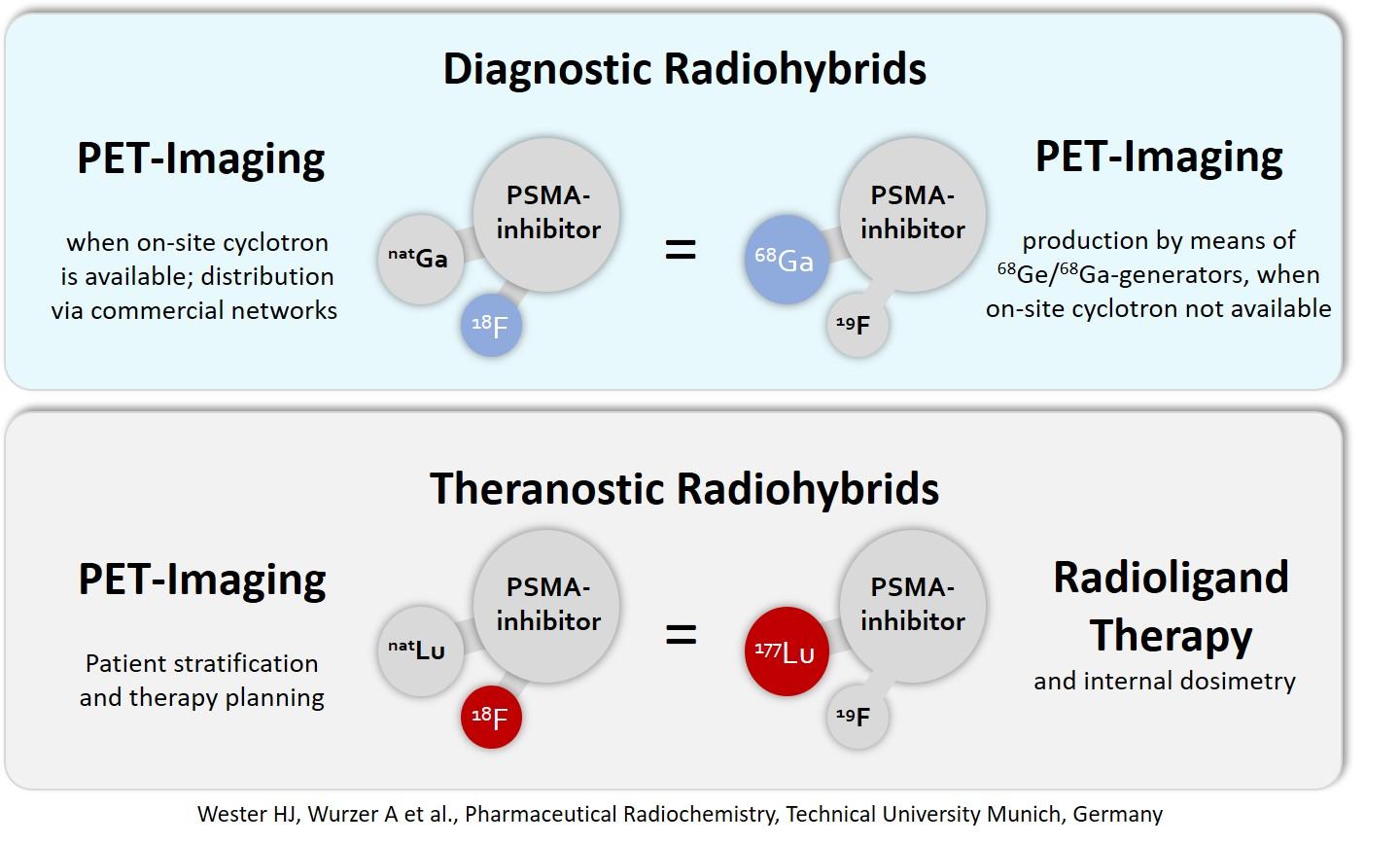
Credit: Wester HJ, Wurzer A et al., Pharmaceutical Radiochemistry, Technical University Munich, Germany
Research presented at the 2019 Annual Meeting of the Society of Nuclear Medicine and Molecular Imaging (SNMMI) describes a new class of radiopharmaceuticals, named radiohybrids (rh), that offer a fresh perspective on cancer imaging and radioligand therapy (theranostics). In addition, the technology encompasses a highly innovative and efficient isotopic labelling method to facilitate broad application.
“Similar to hybrid cars that are driven by either a combustion engine or an electric engine (one is switched on, while the other is switched off), we have designed for the very first time radiopharmaceuticals with two ‘nuclear engines’ or isotopes,” explains Alexander Wurzer at Technical University Munich in Garching, Germany. “For PET (positron emission tomography) imaging, the diagnostic isotope is radioactive (e.g., fluorine-18), while the therapeutic isotope is silent; for radioligand therapy the situation is vice versa.”
A unique feature of such rhPSMA-ligands is that both fluorine and the metal are always present, but only one of them is present as a radioactive isotope (e.g., [18F,natLu]rhPSMA or [19F,177Lu]rhPSMA). “We have also created radiohybrids that offer a choice between two independent imaging isotopes, such as fluorine-18 (18F) or gallium-68 (68Ga), thus allowing for the optimal selection of the radioisotope by individual hospitals worldwide, in consideration of the local clinical infrastructure and isotope availability. Since these pairs of molecules are identical, they represent chemical monozygotic twins, which enables identical imaging with both of the chemical twins.”
Prostate cancer is the most commonly diagnosed cancer among men in the United States, other than skin cancer. According to the American Cancer Society, approximately 175,000 new cases of prostate cancer are diagnosed and more than 31,500 men die from the disease annually in the United States. For this study, prostate-specific membrane antigen (PSMA) was targeted. The researchers developed a platform technology that allows for fast and efficient labeling of peptide and peptide-like radiopharmaceuticals with either fluorine-18 (18F) or radiometals and then synthesized and evaluated several novel rhPSMA ligands.
Testing with six different rhPSMA ligands was carried out on prostate cancer tumor-bearing mice. Based on their high affinity, fast internalization and excellent biodistribution, the DOTA- and DOTAGA-derived inhibitors, rhPSMA-7 and 10, were found to be the most promising candidates for first in human proof-of-concept.
That proof-of-concept was performed using [18F,natGa]rhPSMA-7 PET imaging in a patient suffering from metastatic, castration-resistant prostate cancer. The results showed fast blood clearance, almost no activity transfer into the bladder during imaging; and the radiohybrid compound demonstrated high-contrast PET imaging of lymph nodes and bone metastasis.
Hans-Jürgen Wester, principal investigator of that study, points out, “This unique class of molecular agents opens new pathways for powerful and cost-effective imaging and treatment. Consequently, the first radiohydrid radiopharmaceuticals have been designed to target PSMA – for imaging with high sensitivity and high specificity, as well as effective treatment of prostate cancer, one of the most important cancer types.”
Wester adds, “Based on the promising results obtained with the first [18F][natGa]rhPSMA-imaging agent in proof-of-concept studies in prostate cancer patients, we have already started to broaden this concept to the development of drugs for other important cancer targets, such as somatostatin, bombesin, chemokine and cholecystokinin receptors, to mention only a few.” He explains, “The medium-term objective of these efforts is to promote the PET isotope with the best availability, decay properties and positron energy, fluorine-18, for application in the rapidly growing and important field of theranostics.”
###
Abstract 344: “PSMA-targeted 18F-labeled Radiohybrid Inhibitors: Concept, Preclinical Evaluation, and First Proof of Concept Study in Men,” Alexander Wurzer, Daniel Di Carlo, Alexander Schmidt, Roswitha Beck, and Hans Juergen Wester, Technical University Munich, Garching, Germany; and Matthias Eiber and Markus Schwaiger, Klinikum rechts der Isar, Munich, Germany.
Blue Earth Diagnostics holds exclusive, worldwide rights to radiohybrid PSMA-targeted technology (rhPSMA).
To schedule an interview with the researchers, please contact David Harrison at (410) 804-1728 or [email protected]. All 2019 SNMMI Annual Meeting abstracts can be found online at http://jnm.
About the Society of Nuclear Medicine and Molecular Imaging
The Society of Nuclear Medicine and Molecular Imaging (SNMMI) is an international scientific and medical organization dedicated to advancing nuclear medicine and molecular imaging, vital elements of precision medicine that allow diagnosis and treatment to be tailored to individual patients in order to achieve the best possible outcomes.
SNMMI’s more than 16,000 members set the standard for molecular imaging and nuclear medicine practice by creating guidelines, sharing information through journals and meetings and leading advocacy on key issues that affect molecular imaging and therapy research and practice. For more information, visit http://www.
Media Contact
David Harrison
[email protected]




